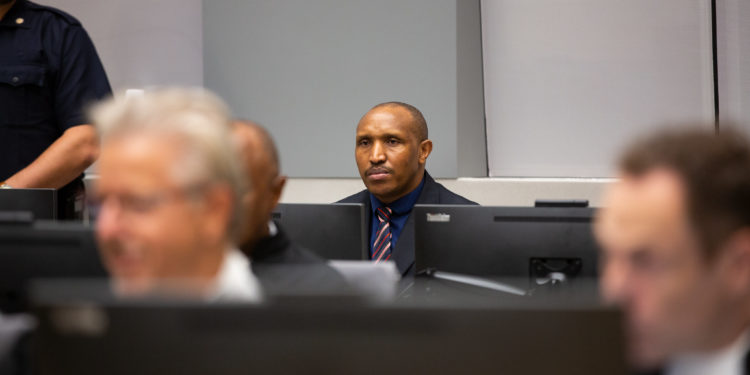Lawyers for Bosco Ntaganda, who was earlier this month sentenced to 30 years in prison, have filed an appeal for his acquittal, arguing that his conviction was invalid because one of the judges of the chamber that convicted him was unfit to serve as an International Criminal Court (ICC) judge.
The defense argues that Judge Kuniko Ozaki, one of the three judges of Trial Chamber VI that unanimously convicted Ntaganda, had lost her appearance of judicial independence when she assumed duties as a Japanese diplomat while still serving as an ICC judge.
According to the defense, Judge Ozaki’s service in the Japanese government affected confidence in her independence and disqualified her from sitting as an ICC judge, whether on a part-time or full-time basis. The defense argues further that Judge Ozaki became ineligible to participate in the Ntaganda trial, as required by Article 74(1), and claims from this point Trial Chamber VI was not properly constituted. Consequently, the defense contends that Ntaganda’s conviction judgment was not validly rendered.
Article 74(1) of the court’s Rome Statute states that all the judges of the trial chamber shall be present at each stage of the trial and throughout their deliberations. In the appeal filed on November 11, defense lawyer Stéphane Bourgon contends that once Judge Ozaki lost the appearance of independence, the conditions for issuing a decision under Article 74(1) could not be fulfilled: “The Judgment, accordingly, is a nullity. A re-trial or permanent stay is required.”
Under Article 40(2), which the defense says Judge Ozaki violated, ICC judges “shall not engage in any activity which is likely to interfere with their judicial functions or to affect confidence in their independence.”
Last June, a majority of the court’s judges rejected a request by Ntaganda’s lawyers for Judge Ozaki’s removal from the trial, after determining that the request did not meet the “high threshold” required to disqualify an ICC judge on the grounds of impartiality. The plenary of judges also termed as speculative the contention by defense lawyers that Judge Ozaki was likely to be biased against Ntaganda because his defense team pushed for her resignation of the ambassadorial post.
In July, Ntaganda was convicted of 18 counts of crimes against humanity and war crimes committed in 2002 and 2003 while he commanded the Patriotic Forces for the Liberation of Congo (FPLC) militia, the armed wing of the Union of Congolese Patriots (UPC).
Ntaganda’s lawyers will file his appeal against conviction in two parts. The first filing, of November 11, raises two grounds: Judge Ozaki’s alleged partiality and the contention that the convictions exceed the charges against Ntaganda.The deadline to file arguments on up to 10 additional grounds was extended to January 14, 2020, to accommodate translation of the judgment into Ntaganda’s native language, Kinyarwanda, which the court’s Registry said would be completed in the first week of January 2020.
Bourgon argues that the plenary of judges adopted an erroneously narrow view of judicial independence when it declined to disqualify Judge Ozaki. The defense is thus raising to the Appeals Chamber the same arguments that it raised when it sought the judge’s disqualification by the plenary.
According to defense lawyers, Judge Ozaki’s resignation as a full-time judge also destroyed her appearance of independence by shifting the source of her income primarily to Japan, yet judicial remuneration must be independent of executive control to present the appearance of independence. “Judge Ozaki – while still deliberating on the Ntaganda case – was paid mainly, at least for a period, by the Government of Japan, and without any publicly-known guarantee of non-reduction of salary that is essential to the reality and appearance of judicial independence,” states the appeal.
Further, the lawyers argue that Judge Ozaki’s subsequent resignation as Japan’s ambassador did not restore her judicial independence because she had already engaged in an activity compromising her independence. They say the judge’s “failure” to inform the court’s presidency that the purpose of her becoming a part-time judge was to avoid the prohibition on engaging in “any other occupation,” further undermined her appearance of independence.
In the second appeal ground argued in the November 11 filing, the defense says the trial chamber erred in convicting Ntaganda of at least 15 criminal acts that were not within the scope of the charges that were confirmed. It states that the chamber erroneously blamed the UPC/FPLC or Ntaganda for all crimes committed in all locations mentioned by the confirmation decision.
The defense lists various acts that it claims were not confirmed and do not fall within the facts and circumstances described in the charges, yet those acts form part of the convictions against Ntaganda. They include the murder of nine patients at Bambu hospital; murder of two children in Kobu; murder of various individuals in Kilo, Mongbwalu, and Sayo; murder of an unspecified number of men after their rape by UPC/FPLC soldiers; rape of women and girls in Mongbwalu and Kobu; and rape and sexual slavery of two identified female child soldiers.
This was first published on the International Justice Monitor.







